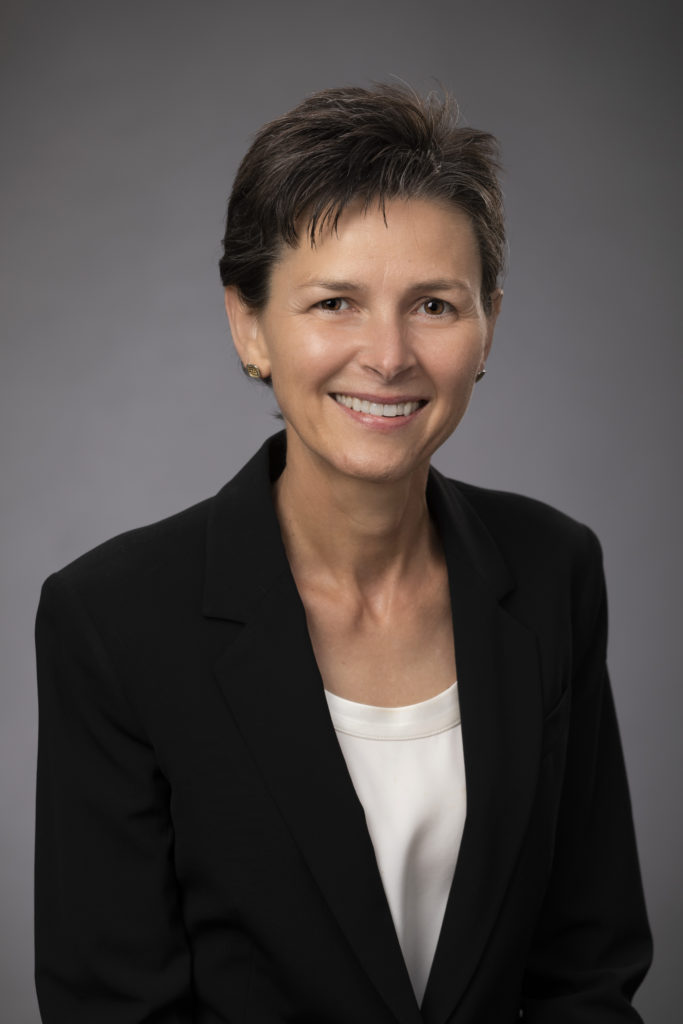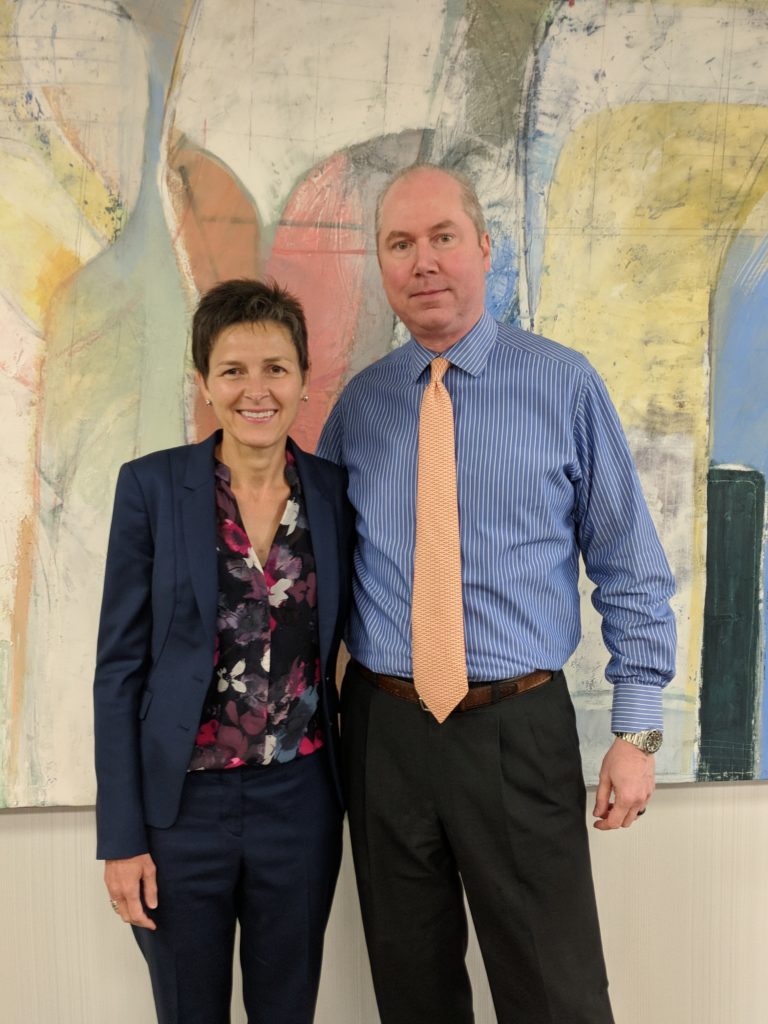
Charlotte Rasche is the general counsel of Prosperity Bank and the recipient of the 2020 Houston Corporate Counsel M&A Transaction of the Year thanks to peer pressure 24 years ago.
You see, Rasche had no interest in being a lawyer. She went to law school because she thought a doctor of jurisprudence degree would benefit her future career in higher education more than a Ph.D or Ed.D. But her fellow students at the University of Texas School of Law were dropping resumes at law firms for summer clerkships.
So, she did, too. Bracewell took notice. The attraction was mutual.

“I was impressed with the type of work as well as the collegiality of the firm,” she said. “My experience at Bracewell made it an easy decision to change my path.”
In the two decades since, Rasche has handled more than 30 M&A transactions for Prosperity Bank – first as a lawyer at Bracewell and now as the financial institution’s chief legal officer. When she joined Prosperity Bank in 2012 as general counsel, the bank had $9 billion in assets. That sum grew to $23 billion heading into 2019.
None of those deals, however, were close to being as large or important as Prosperity’s $2.1 billion purchase of Plano-based LegacyTexas Bank. In the works for more than two years, Prosperity’s acquisition of LegacyTexas added 42 branches in 19 Texas cities and $9.3 billion in assets to the Houston financial institution’s ledger.
“At the time, there were several opportunities that the company had [for potential mergers], but the Legacy transaction was the best fit strategically and culturally,” Rasche told The Texas Lawbook. “The decision to pursue it was an easy one.”
The Association of Corporate Counsel’s Houston Chapter and The Texas Lawbook awarded Rasche and Bracewell partner Will Anderson, who served as lead outside counsel, with the 2020 Houston Corporate Counsel Award for M&A Transaction of the Year.
Premium Subscribers: Go here for an exclusive Q&A with Charlotte Rasche. She provides personal insights, how she selects outside counsel and key things outside counsel should know about her. For information on premium subscriptions, including marketing and advertising benefits please contact Brooks Igo at brooks.igo@texaslawbook.net .
Rasche said Anderson and the Bracewell team were the perfect legal advisors for the acquisition because the Houston-based firm has represented Prosperity since its inception in 1983 and has handled most of the bank’s 43 M&A transactions.
“Bracewell has a strong corporate and securities team and is very familiar with the company,” she said. “There were many moving pieces with this transaction given the public company status of both parties, the size of deal and the regulatory requirements involved. Bracewell had the knowledge and experience to guide us through all aspects of the deal.”
Anderson said the Prosperity team, including assistant general counsel Annette Tripp and legal counsel Jessica Lee Freedson, did a lot of work on the legal and financial due diligence, negotiated the commercial terms and pricing, handled the social issues and interfaced with bank regulators, talking with them in advance of a transaction.
“We were in the background for a while,” Anderson said. “But once they were close to a deal, we came in and helped with the merger agreement and regulatory matters – including partner Josh McNulty – and brought the full team in terms of specialists, with over 20 lawyers working on the deal in Dallas, Houston, Austin and New York.”
The transaction closed this time last year.
Music, Arts and Books Shaped Rasche’s Early Life
Rasche was born in Tempe, Arizona, but the family soon moved to Illinois, where her father worked at Southern Illinois University as a librarian. When she was 10, her parents moved to Galveston to interview for a position at the University of Texas Medical Branch.
“While my father was in interviews, my mother and I swam at the beach and the hotel pool,” she said. “When we tried to fly home the next day, the St. Louis airport was closed because of snow. That sealed the deal for my dad, and he accepted the position.”
Rasche’s father, who had advanced degrees in library science, worked specifically with rare medical books. He was an excellent cook and loved music and art. He passed away in 2003.
Her mother is a musician, playing the pipe organ, piano and viola. She received a master’s degree at the American Conservatory of Music in Chicago and played in the Chicago Symphony while in school. Her mother was a Fulbright scholar who studied at the Royal Conservatory in Belgium. She became the organist and choir director at Moody Methodist Church in Galveston in 1975 and is currently organist emerita. She is also a charter member of the Galveston Symphony and played viola for it for 40 years.
Rasche’s mom turns 95 in January.
“As my parents were artistic, I grew up with a focus on that, playing piano and violin, learning the titles to all of Renoir’s paintings, visiting antique stores and various other activities my father thought would be fun,” she said.
Rasche said she wanted to play sports when she was young and finally convinced her parents to let her sign up for Lassie League girls’ softball in the fifth grade.
“I was bad and consequently assigned to right field,” she said. “It was evident that sports were a stretch for us when the coach followed me to my mom’s car and asked her to buy me a left-handed glove. I cherish all that I learned and was exposed to growing up.”

Rasche was drawn to problem-solving and the logic and the creativity involved in those, but she had no lawyers in her family. She earned her bachelor’s degree in business administration from Stephen F. Austin University and a master’s degree in higher education from Oklahoma State University.
Upon graduation, she worked for the Texas Tech University housing department, where she served as a coordinator overseeing half of the residence halls on campus.
“This article isn’t long enough for all of the stories, but let’s just say that freshmen men can find all types of things to cook in a microwave,” she said. “I have fond memories of my time at Tech and the talented and caring colleagues that I worked with. It was there where I learned true teamwork and how to supervise a diverse workgroup.”
Rasche was interested in leadership positions in high education, such as being the dean of students. She thought a law degree would be beneficial. She went to Barnes & Noble, bought a book on taking the LSAT, worked all of the problem tests, took the exam and sent her scores to three Texas law schools. She was accepted at all three. She chose UT Austin.
Hooked on Financial Services
Bracewell hired her to join its financial services practice in 1997. Bracewell asked Rasche to select sections that interested her during her clerkship. She knew she wanted to focus on transactional work.
“I knew nothing about financial services and wanted more information about tax, so an associate called from each section to give me a brief overview,” she said. “Duncan Stewart, current CEO of Texas Citizens Bank, was the associate who called from financial services, and his summation piqued my interest.
“I was hooked,” she said. “It was the beginning of my journey in financial services.”
Bracewell partners such as Will Luedke, Waverly Vest, Bob Clarke and Duncan Stewart served as mentors.

The team celebrating the Legacy deal at a Cher concert
“As a whole, the attorneys at Bracewell were very collegial, something that was important to me when looking for a firm,” she said. “That collegiality lent itself to formal and informal mentorship from attorneys in various sections throughout the firm.”
During her 14 years at Bracewell, Rasche worked on scores of bank M&A. She represented La Grange-headquartered Texas United Bancshares in at least five or six acquisitions and Encore Bank in multiple deals before their sale to Cadence Bank in 2012. And she advised Southern National Bancorp of Virginia in several acquisitions, including its sale to Provident Bank.
But Prosperity became her closest client. She did more than 30 transactions for Prosperity while at Bracewell, including the bank’s initial public offering in 1998.
“While it was intensive and challenging work, it also allowed for the opportunity to build strong lasting relationships with clients,” she said.
In 2012, Prosperity’s then general counsel, Peter Fisher, invited Rasche to lunch and told her he planned to retire.
Rasche Becomes Real Lawyer at a Real Bank
“I was intrigued,” she said. “I had built strong relationships with the management team and admired their strategic focus, work ethic and how they treated others. It was a tough decision to leave the firm, but I felt that this opportunity to work with a client that I had such deep relationships with was one that I couldn’t pass up. It has been an incredible opportunity and allowed me to broaden my legal and business skills.”
In the eight years since, Rasche has been front and center in more than a dozen acquisitions, including the Bank Arlington, Bellaire-based Community National Bank, First Victoria National Bank, Coppermark Bank of Oklahoma City and First Federal Bank of Tyler.
Eight transactions between 2012 and 2014 nearly doubled Prosperity’s asset size.
“Once a bank crosses over $10 billion in assets, the rules change,” she said. “The regulatory expectations are different and the examination process is ongoing. We saw many departments, such as internal audit, compliance and bank secrecy grow significantly to meet the expectations.”
For example, Prosperity’s internal audit department, which Rasche oversees, grew from three people to 22 today. The legal department has doubled its size under Rasche’s tenure. The compliance group, which also falls under Rasche’s umbrella, grew from five people to 40.
A Long Courtship and a Rapid Closing
Prosperity’s acquisition of LegacyTexas was certainly the biggest deal for Rasche.
LegacyTexas’ legal work was led by then-COO and general counsel Scott Almy, who tapped attorneys from Shapiro Bieging Barber Otteson out of Denver.
Prosperity and LegacyTexas had been talking about a possible combination for two years. Discussions became serious when LegacyTexas approached the $10 billion asset mark, which is a data point when banks are subject to additional regulations that can be costly.
“We dated for two years,” Almy told The Texas Lawbook M&A writer Claire Poole in an interview in January 2020. “We evaluated other opportunities during that period, but after the BB&T and SunTrust merger was announced (in February), it jumpstarted and accelerated our discussions.”

Rasche with Will Anderson of Bracewell
Rasche said LegacyTexas was looking to either “make a big splash over $10 billion” or combine with a larger institution.
“(CEOs) David (Zalman) and Kevin (Hanigan) started talking again, and the executive and management teams got together at the end of March to discuss more about what the deal would look like and began some due diligence,” she said. “We took our time and got to know each other. And by the end of May, we submitted a revised offer to Legacy.”
The institutions hired bankers – JPMorgan’s Travis Machen in New York for LegacyTexas and Keefe Bruyette & Woods’ Craig McMahen in Austin for Prosperity – and the two sides got to work.
Rasche and Almy worked very closely negotiating some of the commercial terms to get issues resolved.
“There was not a lot of time for negotiation and documents,” Rasche said. “From the overall deal side, the social issues and pricing, of course, are the most time consuming and challenging. From the legal side, the biggest challenge is balancing the desire to sign and announce quickly once terms were reached with ensuring that all issues are vetted and properly addressed whether in the transaction documents or otherwise.
“Both the Prosperity and LegacyTexas legal teams worked diligently during the transaction, which led to the next chapter of war stories and new nicknames for team members after many long nights,” she said.

Rasche said Anderson and the Bracewell team were critical to the deal’s success.
“We were so busy on a lot of different things going on – diligence, deal terms, investor presentations,” she said. “So a lot of legal detail fell to Bracewell, including the drafting of the agreement, the research and ways we could structure things. Bracewell would say, ‘We need to do x, y and z,’ and we would say, ‘We’ll do that.’”
Because both banks were public companies, there also were a lot of Securities and Exchange Commission regulations to adhere to – and it had been a while since the bank had bought a public entity (SNB Bancshares Inc. in 2006 and Texas United Bancshares Inc. in 2007).
“With two public companies coming together, there was the usual litigation that resulted from that,” Anderson said. “We dealt with that quickly and got it resolved.”
The deal was announced June 17.
“We worked very hard to not only close the transaction, but to close it within four and a half months,” Rasche said. “That is a remarkable schedule for a transaction of that size with the regulatory requirements involved. Having dedicated and experienced in-house and external legal teams, as well as a strong general counsel and external legal team at LegacyTexas, made it possible for us to meet the high expectations of the executives at both companies.”
The deal closed Nov. 1.
“While it was challenging, there was adrenaline going and everyone was working hard,” she said. “But it didn’t feel like such hard work. It’s what we do.”
